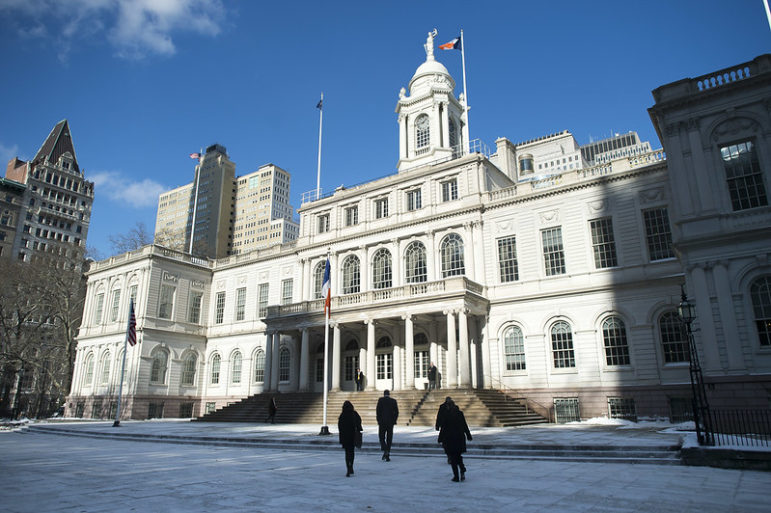City Limits hosted a virtual discussion on the challenges and opportunities ahead for the next mayor. Featuring panelists Kyle Bragg of 32 BJ SEIU, New York State Senator Jessica Ramos, Jennifer Jones Austin of advocacy organization FPWA, Sandra Lobo of Northwest Bronx Community and Clergy Coalition and Kathryn Wylde of the Partnership of New York.

Rob Bennett/Mayor’s Office
The next mayor faces both challenges and opportunities.The mayoral race is unfolding at a time when New York City faces a budget crisis and expects to lose billions of dollars in revenue through 2022, and when the need for city services is even higher due to the toll of the COVID-19 pandemic.
While investments in health services, small businesses and working class people have long been crucial, the pandemic only raises the stakes, and the city budget crisis poses additional challenges, experts said during a virtual discussion City Limits hosted Thursday. The event, “Out of the Ashes Again? The 2021 Election and the Remaking of New York,” featured panelists Kyle Bragg of 32 BJ SEIU, New York State Senator Jessica Ramos, Jennifer Jones Austin of advocacy organization FPWA, Sandra Lobo of Northwest Bronx Community and Clergy Coalition and Kathryn Wylde of the Partnership of New York.
Watch the full conversation below:
As City Limits reported in May, there was once hope that federal legislation like The Heroes Act, which passed the House in the spring but never got through the Senate, would help the city fund needs specific to the pandemic, such as hazard pay for essential workers. However, over the summer, it became clear that the Trump administration and the GOP-led Senate would not be delivering any such help anytime soon. Thursday’s panelists agreed that even once President-Elect Joe Biden is inaugurated in January, it will likely take some time before Congress could pass legislation and for the city to receive funding.
While federal funding is important, still likely won’t be enough, according to Ramos.
“I doubt we’ll be getting the funding for absolutely everything that we need: if we start counting off hazard pay, the MTA, our healthcare services, fully funding our public schools, making sure that our kids, especially who are homeless have access to learning devices and WiFi, we need to make sure that people are fed, we need to avert evictions,” she said.
Ramos also spoke about her proposal for generating revenue by increasing taxes on the wealthiest New Yorkers.
“Federal government has money. Billionaires have money. Working class New Yorkers? Zero money. Small businesses? Zero money. We’ve got to look at where the money is and we need to make sure that it’s flowing back to our economy,” she said. “This is the time to invest in people, not to keep insisting on austerity politics and austerity budgeting that has only driven us and our services to the ground.”
Panelists returned frequently to this theme: that now is not the time to reduce services for New Yorkers. Given the ongoing pandemic, we haven’t seen yet the full extent of the ripple effects on the city’s economy, and issues like homelessness.
“The need has only grown,” said Jones Austin, adding that food insecurity is still at a high. “If the city doesn’t take the approach that everybody matters and we need to invest in people struggling the most, this is going to spiral out of control.”
Lobo agreed that now is the time to get to the “root cause.” “Here in the Bronx, we felt like we were already in crisis before COVID hit, being the county with the worst health outcomes in New York State, with the highest rates of evictions and housing insecurity, with both residential and commercial tenants being pushed out with rezonings,” she said.
Wylde said the city can look to the 1970s fiscal crisis for lessons on recovery.
“We created an infrastructure where communities were at the table,” she said. “We created programs, and they flowed from the federal government. And I have some hope that the Biden administration is going to buy into an urban community redevelopment commitment and process, where we can get resources directly to the community.”
For the upcoming mayoral contest, panelists agreed that it will be vital for candidates to continue discussing the city’s recovery, and how to make it an equitable one, given the pre-COVID disparities that have worsened throughout the pandemic.
“I don’t think we should go back to normal,” Bragg said. “To recover, we have to bring everyone into it.”








